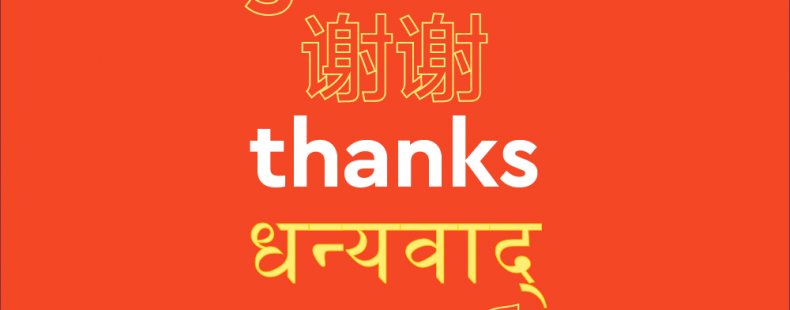During Thanksgiving, we gather around the table and give thanks for all of the blessings we have and the kindness that others have shown us. It is the perfect time to say thanks to all the people who have been there for you and to eat some delicious food, too! Saying “Thank you” is important to show someone that you appreciate them and the nice things they’ve done for you. It is so important, in fact, that languages around the world all have ways to say “Thank you” to express your appreciation. So, there’s no excuse not to be friendly!
To help everybody express their gratitude, we’ve collected ways to say thanks in 30 different languages. Our list consists of the top 30 languages based on the number of speakers, according to Ethnologue. Unfortunately, we couldn’t cover all 7,139 of the world’s known languages, and that means we had to leave out a lot of languages, including many African languages, languages from Oceania, and the many Indigenous languages that are under threat. But this is at least a start—and stay posted, as we give coverage to many other languages, too.
For help with pronouncing the words on our list, Omniglot provides audio files, and you can hear these words spoken out loud.
✏️Quick note on the alphabets
Many of the languages we’ll look at have their own alphabets. We’ve provided each “thank you” as it appears in its native writing system as well as a Latin alphabet approximation. For example, we have Latin alphabet transliterations of words as they appear using the Arabic alphabet, the Russian alphabet (based on Cyrillic script), Chinese characters (Hanzi), and Hindi writing (Devanagari).
English
Thanks (informal)
Thank you (formal)
Mandarin Chinese
Mandarin Chinese is the most commonly spoken form of Chinese.
xiè xie (谢谢): Thank you
Hindi
Depending on how formal you want to be, there are several ways to say thanks in Hindi.
Dhanyavaad (धन्यवाद्): Thank you (formal)
Shukriyaa (शुक्रिया): Thanks (informal)
Thaiṅkyū (थैंक्यू): Thanks (very informal)
Learn some of the words we use today that come from Hindi and Urdu.
Spanish
Gracias: Thank you
¡Muchas gracias!: Thank you very much!
Modern standard Arabic
Shukran (شكرا ): Thank you
Bengali
Dhônyôbad (ধন্যবাদ): Thank you
French
Merci: Thank you
Merci beaucoup: Thank you very much
Russian
Spasibo! (cпасибо!): Thank you!
Portuguese
In Portuguese, the word for “thanks” changes slightly depending on the gender of the speaker.
Obrigado!: Thanks! (male speaker)
Obrigada!: Thanks! (female speaker)
Punjabi
Dhanwaad/Tànvād (ਧਨਵਾਦ): Thank you
Shukrīā/Shukriya (ਸ਼ੁਕਰੀਆ): Thanks
Urdu
Shukriya (شكريه ): Thanks
Bahut shukriya (بہت شكريه): Thanks a lot
Indonesian
Terima kasih: Thank you
Makasih: Thanks! (informal)
German
Danke!: Thanks!
Danke schön!: Thank you very much!
Japanese
In Japanese, how you say thanks depends on how formal you need to be.
Dōmo (どうも): Thanks (least formal)
Arigatō (ありがとう): Thank you (more formal)
Arigatō gozaimasu (ありがとうございます): Thank you very much (most formal)
Marathi
Dhanyāvad (धन्यवाद): Thank you
Ābhārī āhe (आभारी आहे): Thank you
Telugu
Dhanyavadalu/Dhanyavadamulu (ధన్యవాదాలు): Thank you
Kruthagnathalu (కృతజ్ఞతలు): Thank you
Turkish
Teşekkür ederim: Thank you
Tamil
Nandri (நன்றி): Thank you
Mikka nandri (மிக்க நன்றி): Thank you very much
Romba nandri (ரொம்ப நன்றி) Thanks a lot! (informal)
Yue Chinese
Yue refers to multiple different dialects of Chinese that are spoken in Southern China. We will use Cantonese as our example of Yue Chinese.
Mhgòi (唔該): Thank you (for a service)
Dòjeh (多謝): Thank you (for a gift)
Wu Chinese
Like Yue, Wu refers to multiple different dialects of Chinese. We will use Shanghainese as our example of Wu Chinese.
Yáyà (谢谢): Thank you
Korean
When speaking Korean, you’ll need different words depending on formality.
Gomawo (고마워): Thanks (least formal)
Gomapseumnida (고맙습니다): Thank you (more formal)
Gamsahamnida (감사합니다): Thank you (most formal)
Expand your Korean knowledge with even more words that have made their way from Korea into English.
Vietnamese
When saying “Thank you” in Vietnamese, you need to use a respectful pronoun that depends on the age, rank, gender, etc. of the person you are speaking to.
Cảm ơn bà: Thank you (said to an older woman)
Cảm ơn ông: Thank you (said to an older man)
Hausa
Na gode: Thank you
Iranian Persian (Farsi)
There are several different ways to say “Thanks” in modern Persian depending on how formal you need to be.
Moteshakeram (متشکرم ): Thank you (most formal)
Sepâsgozâram (سپاسگزارم): Thank you (formal)
Mamnoon/Mamnoonam (ممنون ): Thank you (less formal)
Mersi/Merci (مرسی ): Thanks (least formal)
Egyptian Arabic
Shukran (.شكرا): Thank you
Shukran gazilan ( .شكرا جزيلا ): Thank you very much
Swahili
Asante: Thank you
Javanese
Matur nuwun (ꦩꦠꦸꦂꦤꦸꦮꦸꦤ꧀): Thank you
Italian
Grazie: Thank you
Molte grazie: Thank you very much
Grazie mille: Literally “A thousand thanks” (similar to “Thanks a million” in English)
Gujarati
Aabhar (આભાર): Thank you
Dhanyavaad (ધન્યવાદ): Thank you (more formal)
Thai
Kòp kun (ขอบคุณ): Thank you
Kòp jai (ขอบใจ): Thanks!
As noted earlier, there are thousands of languages that we couldn’t cover here—from Hawaiian (“mahalo”) to Swedish (“tak”)—that have distinct ways of communicating thanks … and everything else.














